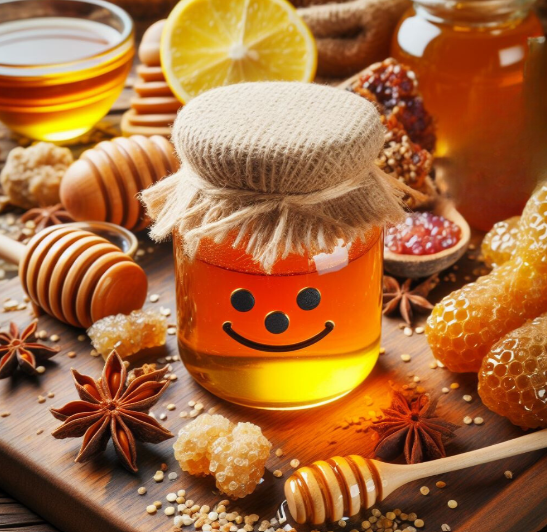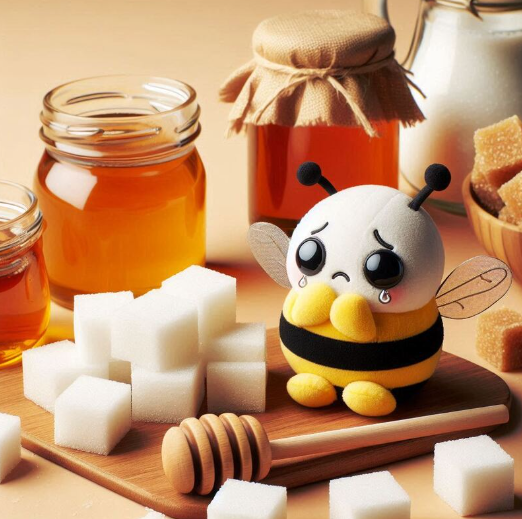
This morning, while enjoying the gentle warmth of the early sun in my garden and engaging in a thoughtful conversation with my friend, I couldn’t help but notice the bumble bees diligently buzzing around the colorful flowers. I shared an interesting fact with my friend: a bumble bee dedicates its entire short life, which lasts just a few weeks, to producing only about a thimble-full of honey. This astounding realization prompted a deeper reflection on the question of how, if a single bee creates such a minuscule amount, we see so many jars of honey lining the shelves of supermarkets.
This led to a conversation with my friend, who pointed out a startling truth: much of what we perceive as honey might not be genuine at all. She highlighted that the innocent-looking jars we often have in our kitchens could be concealing a significant secret about their true contents.
What if the sweet nectar we cherish is not as pure as we have been led to believe? In fact, it may not even qualify as honey at all. This revelation about honey’s authenticity raises important questions about what we are consuming.
Unveiling the Truth Behind Supermarket Honey
Did you know that a significant portion of the honey available in supermarkets originates from countries like China, where it is produced at an astonishingly low cost compared to the honey sourced from local beekeepers? This practice raises eyebrows, especially when we consider that some of these imports may not even be entirely authentic. Alarmingly, it has been reported that some honey products are artificially enhanced with sugar syrup to mimic real honey, leading consumers to unknowingly purchase a diluted version of this natural sweetener.
The reality is that the honey we consume, often labeled as “100% pure,” could actually be a blend of inexpensive substitutes. This is a bitter truth to confront, particularly since many individuals regard honey as a healthier alternative to refined sugar – a misconception we will explore further below.
Another pressing concern is the lack of transparency in labeling when it comes to honey products. Supermarkets often boast about the traceability of their honey back to the beekeeper, yet they conveniently omit crucial information regarding its country of origin. This lack of transparency makes it exceedingly difficult for consumers to make informed choices about the honey they purchase, leaving many in the dark about the true source of their sweetener.
The ramifications of this situation extend far beyond mere consumer deception. Beekeepers around the world are facing financial devastation as cheap, fraudulent honey floods the market, undermining their hard work, dedication, and the vital role of bees in our ecosystem. More alarmingly, there are potential health risks linked to the consumption of adulterated honey, as highlighted by food fraud investigators who warn consumers about the dangers of such products.
These unsettling revelations serve as a wake-up call for all of us. It’s imperative to dismantle the layers of deception and advocate for transparency within our food supply chain. We must become vigilant consumers, scrutinizing labels, asking critical questions, and supporting local producers who prioritize the integrity of their honey products. Moving forward, I am committed to purchasing only local, organic honey, ideally sourced directly from beekeepers or at local farmers markets and farm shops.
As a concerned citizen, I encourage you to join me in raising awareness about this pressing issue. Let’s ensure that the next time we reach for that jar of honey, we do so with our eyes wide open, fully aware of what we are consuming. After all, our health and trust in food systems are far too valuable to be compromised by deceptive practices.
Credible References on Honey Quality and Safety
EU coordinated action “From the Hives” (Honey 2021-2022)

Discover the Remarkable Health Benefits of Organic Honey
If, like me, you are now dedicated to consuming only authentic honey and want to delve deeper into its many benefits, you are in for a treat. Honey is not just a delightful indulgence; it also serves as an incredible source of health benefits. For generations, traditional medicine practitioners have revered honey for its unique healing properties, and there are numerous compelling reasons why incorporating genuine organic honey into your daily diet can enhance your overall health and well-being.
The Nutritional Powerhouse: Understanding Honey’s Unique Qualities
Beyond its delightful sweetness, honey boasts a remarkable nutritional profile, enriched with a diverse range of beneficial components. Scientific studies have revealed that honey possesses powerful antibacterial, antioxidant, anticancer, anti-inflammatory, and antiviral properties. These characteristics make honey not only a delicious sweetener but also a potent ally for your health.
Harnessing Antibacterial Properties for Health
One of the most recognized health benefits of honey is its remarkable ability to inhibit bacterial growth. When applied directly to the skin, honey's natural antibacterial properties can aid in preventing infections and promote the healing of wounds. This makes honey a valuable asset for maintaining overall health and wellness, whether used topically as an ointment or consumed internally as a sweetener.
The effectiveness of honey's antibacterial action can be attributed to enzymes like glucose oxidase, which contribute to the formation of hydrogen peroxide in honey. The high levels of hydrogen peroxide present in honey are closely linked to its wound-healing capabilities and its role as a natural antibacterial agent.
Powerful Antioxidant Benefits of Honey
Honey is rich in antioxidants, which play a crucial role in neutralizing harmful free radicals and protecting cells from oxidative stress. The primary antioxidants found in honey include flavonoids, such as quercetin, and various phenolic compounds. While the body naturally produces some antioxidants, enhancing your intake through dietary sources like honey can support cellular health and significantly reduce the risk of developing chronic diseases, including diabetes, cancer, and heart disease.
Additionally, honey contains short peptides produced by enzymes called proteases, which also contribute to its antioxidant properties. These peptides, which include specific amino acids like cysteine, methionine, and tyrosine, enhance honey’s overall antioxidant capacity. Moreover, it's worth noting that these enzymes assist in digesting proteins into peptides and subsequently into amino acids, which are essential for the body’s repair and growth processes.
Reducing Inflammation: Honey’s Anti-Inflammatory Qualities
Chronic inflammation is linked to a multitude of health issues, including arthritis, cardiovascular diseases, and autoimmune disorders. Research has shown that pure, organic honey contains numerous anti-inflammatory components, including flavonoids such as galangin, caffeic acid, and chrysin. These flavonoids effectively inhibit the production of inflammatory compounds within the body. For those with a penchant for sweetness, incorporating honey into your diet can be especially beneficial, especially since refined sugar is closely related to inflammation. By substituting refined sugar with honey, you can help mitigate the inflammatory response and promote better health.
Anti-Viral Properties of Honey: A Natural Defense
In addition to its antibacterial properties, honey also contains several anti-viral compounds. Scientific studies have indicated that flavonoids such as chrysin, apigenin, quercetin, rutin, and acacetin can effectively reduce the replication of various viruses. This is particularly relevant given that the common cold is a viral infection, making honey a popular ingredient in many cold remedies. However, in line with the adage that “prevention is better than cure,” incorporating organic honey into a well-balanced diet serves as a proactive measure to bolster your defenses against viral infections.
Combating Stomach Ulcers with Honey
Experiencing a stomach or peptic ulcer can be incredibly painful. While honey alone cannot completely prevent stomach ulcers, its inclusion in your diet can help protect against their formation. This protective effect is attributed to the flavonoids and polyphenols present in honey, which possess anti-inflammatory and antibacterial properties. Additionally, for those suffering from mouth ulcers, applying honey several times a day can offer a more pleasant alternative to traditional treatments that may cause discomfort.
Boosting Immune Function Naturally with Honey
Honey plays an essential role in enhancing our immune functions, helping to combat bacteria and viruses effectively. Its natural ability to inhibit the growth of pathogenic bacteria and viruses significantly supports the body’s innate defenses, thereby reducing the likelihood of falling ill. This makes honey a valuable addition to your diet, especially during cold and flu seasons.
With this newfound knowledge, you can ensure that you are not misled into purchasing counterfeit honey. Instead, you can savor the genuine product, which is not only a delightful natural sweetener but also a powerful ally in supporting your health.
Post navigation
Previous Post
 Happiness vs Pleasure: Cherishing What Truly Matters
Happiness vs Pleasure: Cherishing What Truly Matters4 Comments
Comments are closed

I found your reflection on the bumble bees and the nature of honey really thought-provoking! It’s fascinating to think about the incredible dedication of these tiny creatures, especially when you consider how much effort goes into producing just a small amount of honey. It raises so many questions about what we consume and how we can truly understand the quality of what’s in our jars.
I’m glad you found the reflection on bumble bees and honey thought-provoking. It really is incredible to consider the sheer amount of work that goes into producing even a small jar of honey. Those little bees collect nectar from countless flowers, and it makes me think about how interconnected everything is in nature.
Your description of a sunny morning in the garden is incredibly evocative, and it beautifully captures the delicate dance of nature that often goes unnoticed. The fact you shared about bumblebees is not only fascinating but also highlights a critical component of our food system that many people may take for granted. It’s easy to overlook the hard work of these tiny creatures and the intricate processes involved in honey production when we see jars of it filling our pantry shelves.
Your reflection on the dedication of bumble bees and the juxtaposition of that reality with our supermarket shelves certainly invites a deeper contemplation on the nature of honey and, more broadly, our relationships with food and nature. It’s fascinating how something as simple as a jar of honey can lead us to question the authenticity of what we consume, as well as consider the vital ecosystems that produce these treasures.